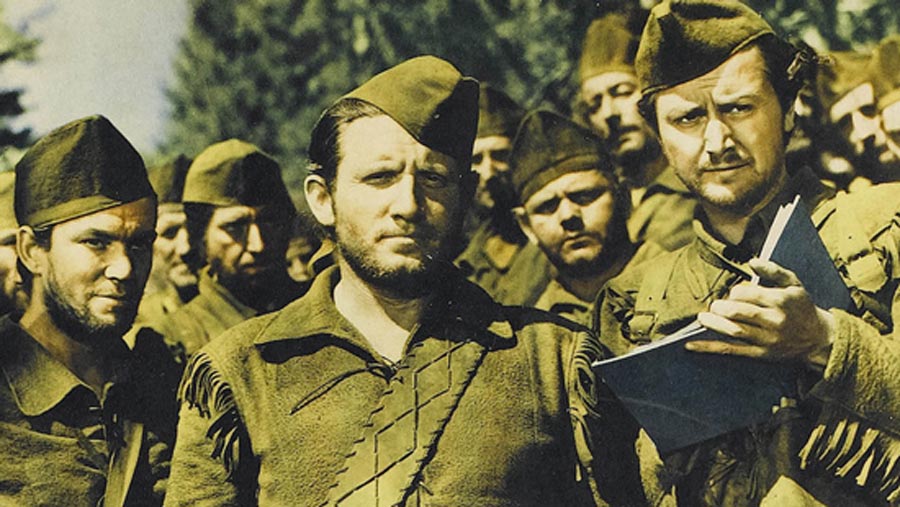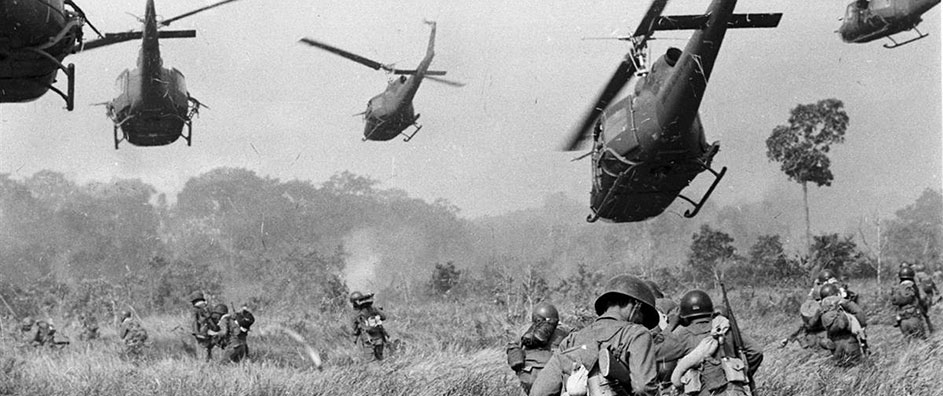The views expressed in our content reflect individual perspectives and do not represent the authoritative views of the Baha'i Faith.
Those old enough and “country” enough to remember Faron Young singing “I Wanna Live Fast, Love Hard, and Die Young,” are also old enough to remember the heroic years of the mid 1950’s when Chevrolet ruled, when James Dean died in the wreck of his Porsche, and Buddy Holly perished in a plane crash. If you were a young male teenager in America at that time, you probably also went to the neighborhood movie theater every Saturday to watch plenty of heroic exploits involving US Marines fighting on beachheads in the South Pacific.
One of my favorite, and probably the scariest, was “Guadalcanal Diary.” The “Sands of Iwo Jima” wasn’t bad, except that John Wayne gets shot at the end. Another favorite of mine was “The Flying Leathernecks,” because I loved (still do) the Chance Vought F4U Corsair, even though, as I recall, the patched-in actual dogfight footage showed chubby Hellcats shooting down Zeroes—it angered me that the movie maker thought I could not tell the difference between the sleek body of the Corsair with its inverted gull wing, and the chubby Hellcats with their straight wings.
Many was the Saturday afternoon I spent at the Army Navy Surplus store in downtown Atlanta rummaging through all sorts of gear: machetes, jungle hammocks, canteens, real army patches to sew on my jacket. The store smelled of waterproof canvas. There were piles of helmets, army knives, pup tents. All of this, I presumed, had been used by somebody in battle.
At night I dreamed of beachheads and jungles with bullets zinging past my face as I aimed my Garand or Browning BAR in the jungle palms to catch a sniper unawares. I remember making my one bedroom window that peered out through a narrow gable in upstairs of the house into the cockpit of a fighter by fashioning an instrument panel out of cardboard, and nailing a steering wheel in front of a small wooden stool. I sat down and flew out over the front yard, releasing torpedoes on unsuspecting Japanese carriers or triggering spats of machinegun fire.

Not infrequently my dreams of glory involved my death, something I am sure I got from seeing Spencer Tracy or Clark Gable receive incalculable amounts of sympathy and admiration and belated affection from Jeanette MacDonald, Gene Tierney, Carol Lombard, or some similar icon of feminine perfection. Naturally, my imagined glory had to be repeated in a variety of different scenarios, since it was hard to imagine myself in any sort of extended afterlife condition in which I would get the same thrill from the accolades and lamentations bestowed on me for my heroic acts.
But that flawed vision of the sympathetic wound on the maimed hero lying on a bed with a grieving girl sitting beside him was not and is not just a product of my invention. I was not, am not, the only neurotic person in the universe. I had been trained, tutored, and teased with this lie from childhood, even as had countless generations of young boys before me.
I came to realize that these dreams of glory were precisely the reason that military recruits are, by and large, so eager to go to war and become heroes, precisely because they are young, too uneducated, and too inexperienced to have learned that pain, and isolation, and death do not make for a neat games from which you quickly recover and emerge as a hero, not in real life.
Nothing noble, or neat, or fun, or daring, or enticing emerges from war. It produces sheer carnage, mindless inhumanity, nothing more or less than insanity. Our history—our “human” history—seems to be spliced together with wars and death.
Of course, history and historical places are also haunted by another equally persuasive theme regarding death, the familiar ubi sunt refrain, a Latin phrase that began many medieval lyrics about the transience of life: Ubi sun qui ante nos ferunt —“Where are those who existed before us?” The Baha’i teachings ask us the exact same question:
The generations that have gone on before you — whither are they fled? And those round whom in life circled the fairest and the loveliest of the land, where now are they? Profit by their example, O people, and be not of them that are gone astray.
Others ere long will lay hands on what ye possess, and enter into your habitations. Incline your ears to My words, and be not numbered among the foolish.
For every one of you his paramount duty is to choose for himself that on which no other may infringe and none usurp from him. Such a thing — and to this the Almighty is My witness — is the love of God, could ye but perceive it.
Build ye for yourselves such houses as the rain and floods can never destroy, which shall protect you from the changes and chances of this life. This is the instruction of Him Whom the world hath wronged and forsaken. – Baha’u’llah, Gleanings from the Writings of Baha’u’llah, p. 260.
The Ubi Sunt phrase expresses brusquely the verity that no matter how strong, or powerful, or influential you may be or may ever be capable of becoming, your ultimate destiny is death, and the loss of everything material you have accomplished or accumulated. In time, everything you become or create will be lost to the memory of men. It is this stark and simple sameness of all our lives that causes the most mighty and heroic to gawk in terror at the great equalizer among us, that peaceful and implacable Elephant of Death.
This beast impels the mightiest among us, who have peered into the dark and pitiless abyss of nothingness, to do anything in their power to forestall it or somehow undo its fatal logic. They think that somehow they will accomplish something so unimaginably great that it will endure to remind the world who they were, be it as inconsequential as a plaque on a park bench or as impressive as a pyramid.
But none of that really lasts. Instead, as Baha’u’llah suggests, only the spiritual transcends death.
Next: The Heroic Mystery of Self-Sacrifice
You May Also Like
Comments

















My question is when are major religions going to stop their pandering to public opinion and instead: (1) openly prohibit their respective members from building or deploying any nuclear weapon and (2) demand that their respective countries immediately start the process of Unilateral Nuclear Disarmament?